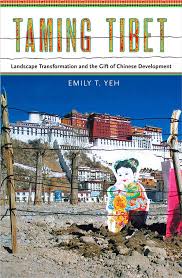Número de ficha: 140582
Me gusta
0
No me gusta
0
Para calificar el registro, es necesario acceder al sistema.
Ir a la página de acceso
- ISBN
- 978-0-8014-5155-3 (cloth : alk. paper)
- 978-0-8014-7832-1 (pbk. : alk. paper)
- Idioma
- eng
- Clasificación DEWEY
- 305.89515 YEH-t
- Autor
- Yeh, Emily T. (Emily Ting), 1971- , autor
- Título
- Taming Tibet : landscape transformation and the gift of Chinese development / Emily T. Yeh
- Lugar de publicación
- Ithaca, New York Cornell University Press 2013
- Descripción
- xvi, 324 pages : illustrations, map, portraits ; 24 cm.
- Tipo de medio digital o análogo
- unmediated rdamedia
- Medio de almacenamiento
- volume rdacarrier
- Serie
- Studies of the Weatherhead East Asian Institute, Columbia University
- Nota de Resumen
- "The violent protests in Lhasa in 2008 against Chinese rule were met by disbelief and anger on the part of Chinese citizens and state authorities, perplexed by Tibetans' apparent ingratitude for the generous provision of development. In Taming Tibet, Emily T. Yeh examines how Chinese development projects in Tibet served to consolidate state space and power. The master narrative of the PRC stresses generosity: the state and Han migrants selflessly provide development to the supposedly backward Tibetans, raising the living standards of the Han's "little brothers." Arguing that development is in this context a form of "indebtedness engineering," Yeh depicts development as a hegemonic project that simultaneously recruits Tibetans to participate in their own marginalization while entrapping them in gratitude to the Chinese state. The resulting transformations of the material landscape advance the project of state territorialization. Exploring the complexity of the Tibetan response to--and negotiations with--development, Taming Tibet focuses on three key aspects of China's modernization: agrarian change, Chinese migration, and urbanization"-- Publisher's Web site.
- Fuente de adquisición
- Gobi ; compra ; 26/07/2018
- Materia
- Desarrollo Económico -- Tíbet (China)
- Ayuda Económica China
- Tibetanos -- Identidad Étnica
- Materia Nombre Geográfico
- Tíbet (China) -- Relaciones Étnicas
- China -- Relaciones Étnicas
| etiq. | info |
|---|---|
| 001 | 17753542 |
| 005 | 20140814131042.0 |
| 006 | a |
| 008 | 130524s2013 nyuabc frb 001 0 eng c |
| 020 | |a978-0-8014-5155-3 (cloth : alk. paper) |
| 020 | |a978-0-8014-7832-1 (pbk. : alk. paper) |
| 035 | |a140582 |
| 040 | |aNIC/DLC|beng|cNIC|dDLC|dCOLMICH|erda |
| 041 | |aeng |
| 042 | |apcc |
| 043 | |aa-cc-ti|aa-cc--- |
| 082 | 00|a305.89515|bYEH-t |
| 100 | 1 |aYeh, Emily T.|q(Emily Ting),|d1971-|eautor |
| 245 | 10|aTaming Tibet|blandscape transformation and the gift of Chinese development|cEmily T. Yeh |
| 264 | 1|aIthaca, New York|bCornell University Press|c2013 |
| 300 | |axvi, 324 pages|billustrations, map, portraits|c24 cm. |
| 336 | |atext|2rdacontent |
| 337 | |aunmediated|2rdamedia |
| 338 | |avolume|2rdacarrier |
| 490 | 0 |aStudies of the Weatherhead East Asian Institute, Columbia University |
| 520 | |a"The violent protests in Lhasa in 2008 against Chinese rule were met by disbelief and anger on the part of Chinese citizens and state authorities, perplexed by Tibetans' apparent ingratitude for the generous provision of development. In Taming Tibet, Emily T. Yeh examines how Chinese development projects in Tibet served to consolidate state space and power. The master narrative of the PRC stresses generosity: the state and Han migrants selflessly provide development to the supposedly backward Tibetans, raising the living standards of the Han's "little brothers." Arguing that development is in this context a form of "indebtedness engineering," Yeh depicts development as a hegemonic project that simultaneously recruits Tibetans to participate in their own marginalization while entrapping them in gratitude to the Chinese state. The resulting transformations of the material landscape advance the project of state territorialization. Exploring the complexity of the Tibetan response to--and negotiations with--development, Taming Tibet focuses on three key aspects of China's modernization: agrarian change, Chinese migration, and urbanization"--|cPublisher's Web site. |
| 541 | |aGobi|ccompra|d26/07/2018 |
| 598 | |aCER |
| 598 | |aJULIO2018 |
| 650 | 0|aDesarrollo Económico|zTíbet (China) |
| 650 | 0|aAyuda Económica China |
| 650 | 0|aTibetanos|xIdentidad Étnica |
| 651 | 0|aTíbet (China)|xRelaciones Étnicas |
| 651 | 0|aChina|xRelaciones Étnicas |
